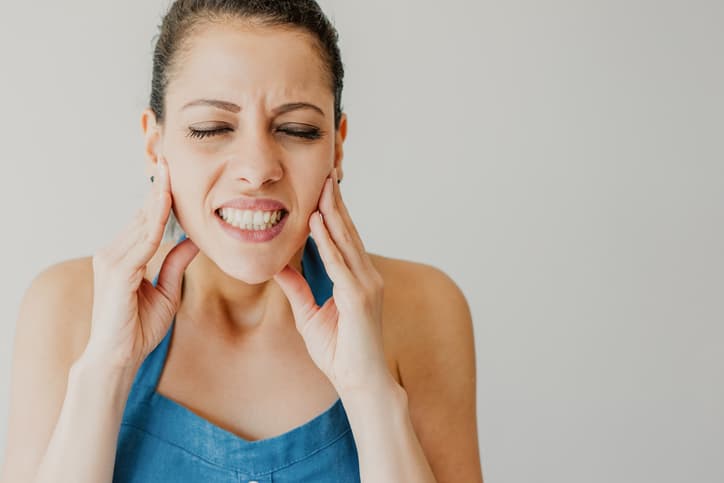
Teeth clenching could be the cause of some of your dental problems, so look out for these symptoms:
- Morning headaches
- Sore jaw or facial muscles
- Neck pain
- Chipped or cracked teeth
- Sensitive or loose teeth
How to Stop Teeth Clenching
Teeth clenching/grinding can happen for a number of reasons, but there are a few things you can do that might keep clenching at bay. While these methods might help, treatment varies from person to person. Always ask your dentist before changing your routine and follow any recommendations they may give you to treat teeth clenching.
1. Reduce stress.
Stress is one of the leading causes of teeth clenching and teeth grinding. Try these tricks to help reduce stress and save your teeth from taking the heat.
- Think positive. Practice actively letting go of negative thoughts. Before bed, take five minutes to address anxieties in your life by writing down your feelings and thoughts in a notepad. This practice can help calm any negative thoughts that could be triggering teeth clenching at night.
- Practice mindful awareness. Make yourself aware of the tension in your jaw as you drift off into sleep. If you’re having trouble identifying the source of the stiffness, actively loosen and relax all of the muscles in your jaw and face one by one. If you wake up during the night, repeat the relaxation process before falling back to sleep.
- Ask your partner for help. If you’re keeping your partner awake with sounds of teeth grinding at night, ask them to nudge you next time they notice you grinding. Before you turn over to sleep again, repeat the mindful awareness exercise.
2. Wear a mouth guard.
If you’re still having trouble figuring out how to stop clenching your teeth at night, talk to your dentist about getting a mouth guard. You can wear a night guard to help prevent damage to your teeth while you sleep, but it won’t eliminate your bruxism. You can get a mouth guard over the counter or one that’s custom-made by your dentist. Custom mouth guards usually yield better results for severe grinders because they are personalized based on your exact needs, but they can be more expensive than over-the-counter options. Talk to your dentist about what option is best for you.
3. Correct misaligned teeth.
For some people that grind their teeth, it can be caused by a problem with teeth alignment. Your dentist might recommend braces or other orthodontics to help correct your bite and alignment. If bruxism has worn down your teeth enough to cause a problem chewing, your dentist may correct teeth alignment with reconstructive treatments, such as crowns or overlays.
Teeth Clenching in Children
Adults are not the only people affected by teeth clenching. Children can also suffer from stress-induced teeth clenching. If you hear them grinding at night, or if they complain of tooth pain, facial discomfort or headaches, schedule an appointment with your child’s dentist.
Teeth clenching can be painful and frustrating, so don’t hold back from talking to your dentist. There are many options to help treat teeth clenching, so don’t wait to reach out for help and start trying solutions.
